Google’s April 2023 reviews update was more volatile than the previous product reviews update, data providers say
This update was more widespread than previous updates because it targets more than just product reviews.
The April 2023 reviews update created more volatility in Google’s search results than past versions of the update, including the February 2023 product reviews update, according to Semrush and Rank Ranger data.
About the Google April 2023 reviews update. The update started to roll out at about 12 p.m. ET on April 12. This update took 13 days and completed on April 25, 2023.
This was the seventh reviews update and the first Google update that targeted more than just product reviews. Yes, this version went beyond Google’s prior product reviews updates to evaluate reviews of any topic that is reviewable, including:
- Services and businesses.
- Destinations.
- Media (e.g., games, movies).
Google changed the name of its “product reviews system” to “reviews system” and has altered the language in multiple parts of its guidance documentation around product reviews to now apply to all types of reviews.
Data shows the April 2023 update was more significant
Semrush. Semrush data showed that the April 2023 reviews update was more volatile than the previous reviews update, the February 2023 product reviews update.
“Overall, comparing the baseline to the update periods the April 2023 reviews update was slightly more volatile than the February 2023 product reviews update,” Mordy Obersterin, from Semrush told us.
Here is a look at thre Semrush sensor, showing the volatility it tracked over the past few weeks. You can see most of that volatility was during the last week of the update.

This chart shows the break down by vertical, comparing April 2023 to February 2023:
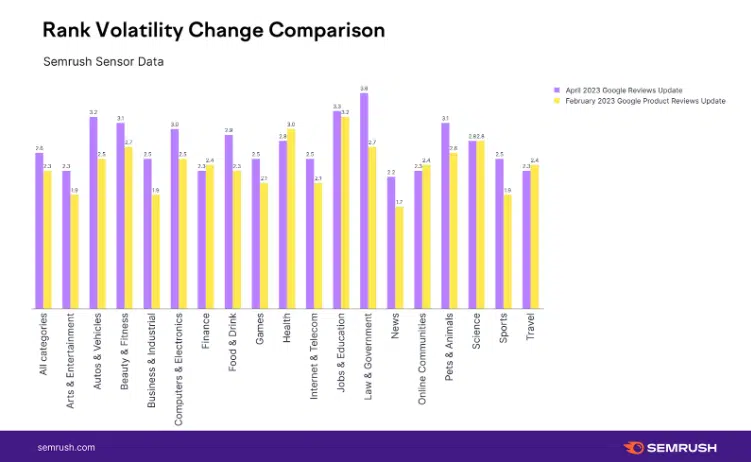
If you look at the peak of the volatility, you will notice that the February spiked higher than the highest peak we saw in the April 2023 update:
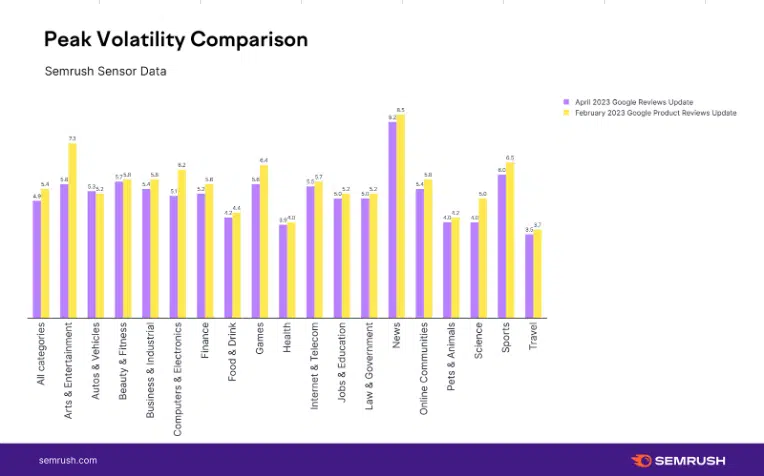
Semrush also showed how there were more URLs newly ranking among the top ten results that prior to the update ranked 20+ back in February:
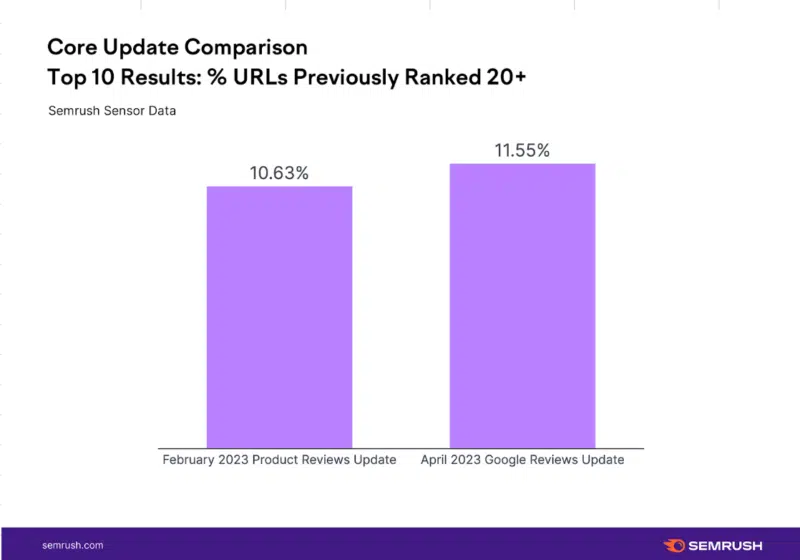
Rank Ranger. Rank Ranger data told a similar story. The April 2023 reviews update was more volatile than the previous reviews update, the February 2023 product reviews update.
“Although the update rolled out on April 12th, the Rank Risk Index reported high levels of fluctuations on April 20th, peaking on April 25th. This analysis is based on the fluctuations on April 25,” Darrell Mordecai from Rank Ranger told us.
Here is what the Rank Ranger Rank Risk Index showed over the past few weeks. Again, you can see most of that volatility was during the last week of the update. Rank Ranger is reporting that volatility is continuing, two-days after the update was completed.
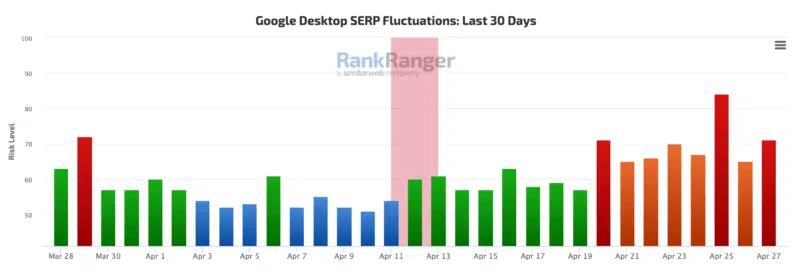
Here is a chart comparing the two past updates, showing the April 2023 update to be more volatile than the February 2023 update. “April update made significantly more impact than the February update. This could possibly be explained by the fact that the April update has been extended to include all reviews and not just product reviews,” Mordecai added.
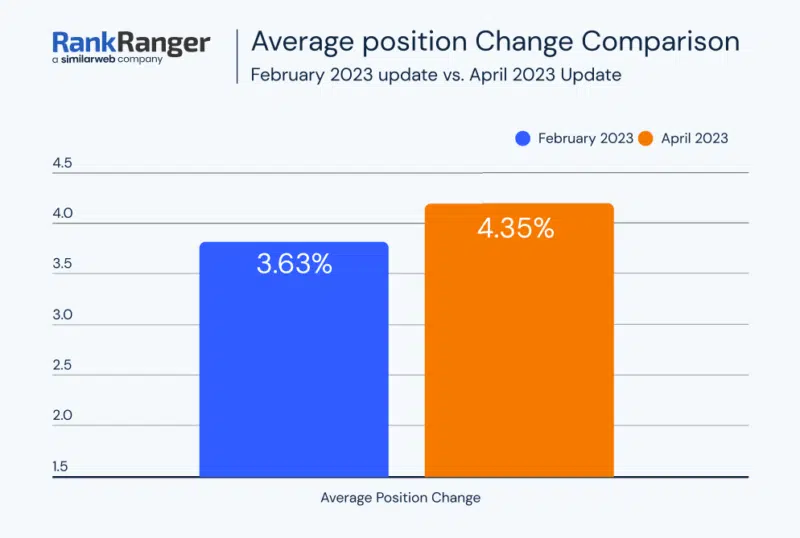
There was substantial volatility in the top 5 results comparing April to February. In April, 72% of rankings were affected compared to 49% in February. There was slightly more volatility among the top 3 results in April than February, and slightly less volatility in the top 10 results in April than February.

And looking at it by industry, you see which verticals were more volatile as you break it down by top 3, top 5 and top 10 results.

Community. The SEO community chatter was pretty limited relative to other updates during the first week of the update. It heated up in the second week of the update, until Google announced the update was complete.
In short, the spikes in volatility in the Semrush and RankRanger data were in lockstep with level and timing of chatter in the SEO community.
More on the April 2023 reviews update
Previous product review updates. This is the seventh release of the formerly known as product reviews update, now the reviews update. It began April 12 at about 12 pm ET.
The first product reviews update was launched on April 8, 2021, the second was launched on December 1, 2021, the third has been released on March 23, 2022, and the fourth was released on July 27, 0222, and the fifth was released on September 20, 2022 and the sixth was released on February 21, 2023.
Google’s updated advice. Here is the updated advice Google published related to this update:
- Evaluate from a user’s perspective.
- Demonstrate that you are knowledgeable about what you are reviewing—show you are an expert.
- Provide evidence such as visuals, audio, or other links of your own experience with what you are reviewing, to support your expertise and reinforce the authenticity of your review.
- Share quantitative measurements about how something measures up in various categories of performance.
- Explain what sets something apart from its competitors.
- Cover comparable things to consider, or explain which might be best for certain uses or circumstances.
- Discuss the benefits and drawbacks of something, based on your own original research.
- Describe how a product has evolved from previous models or releases to provide improvements, address issues, or otherwise help users in making a purchase decision.
- Focus on the most important decision-making factors, based on your experience or expertise (for example, a car review might determine that fuel economy and safety are key decision-making factors and rate performance in those areas).
- Describe key choices in how a product has been designed and their effect on the users beyond what the manufacturer says.
- Include links to other useful resources (your own or from other sites) to help a reader make a decision.
- Consider including links to multiple sellers to give the reader the option to purchase from their merchant of choice.
- When recommending something as the best overall or the best for a certain purpose, include why you consider it the best, with first-hand supporting evidence.
- Ensure there is enough useful content in your ranked lists for them to stand on their own, even if you choose to write separate in-depth single reviews.
Why we care. If your website offers general review content, you will want to check your rankings to see if you were impacted. Did your Google organic traffic improve, decline or stay the same?
Long term, you are going to want to ensure that you put a lot more detail and effort into your review content. Make it unique so it stands out from the competition on the web.
This data shows that many sites experienced some big changes to rankings. If you did tool, you are not alone.
Related stories
New on Search Engine Land